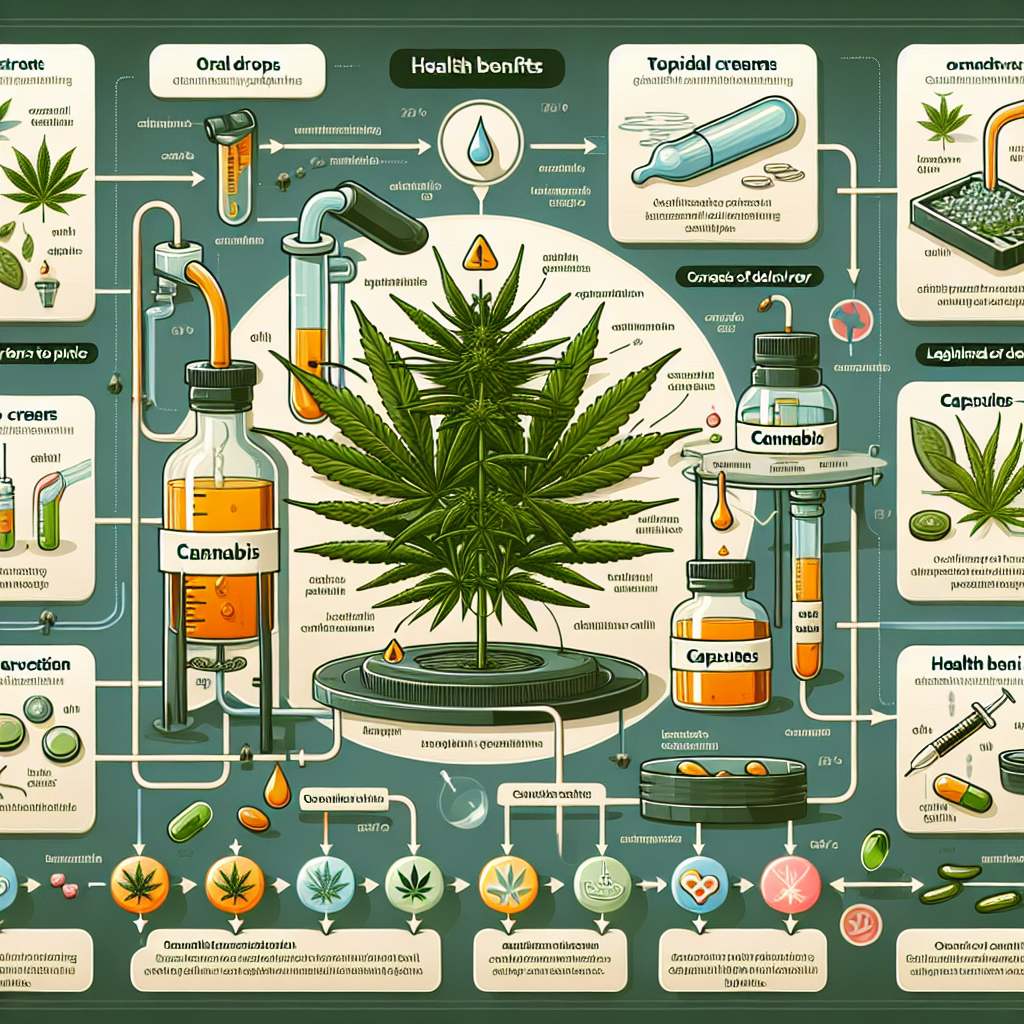Cannabis extracts and oils have emerged as significant components in the realm of medical treatments, offering a range of therapeutic benefits for various health conditions. These substances are derived from the cannabis plant and contain active compounds such as cannabinoids, including cannabidiol (CBD) and tetrahydrocannabinol (THC), which interact with the body’s endocannabinoid system to produce medicinal effects. Medical cannabis extracts and oils are utilized to alleviate symptoms associated with chronic pain, epilepsy, multiple sclerosis, anxiety, and other ailments. They are administered in various forms, including tinctures, capsules, topical applications, and vaporizers, providing patients with versatile options for consumption. The growing body of research and patient testimonials underscores the potential of cannabis extracts and oils in enhancing quality of life and managing complex medical conditions.
Benefits Of Cannabis Extracts In Pain Management
Cannabis extracts and oils have garnered significant attention in recent years for their potential benefits in medical treatments, particularly in pain management. As more research unfolds, the therapeutic properties of these natural compounds are becoming increasingly recognized, offering a promising alternative to traditional pain relief methods. The use of cannabis extracts and oils in pain management is rooted in their interaction with the body’s endocannabinoid system, which plays a crucial role in regulating pain, mood, and inflammation.
One of the primary benefits of cannabis extracts in pain management is their ability to provide relief without the severe side effects often associated with conventional pain medications. Opioids, for instance, are commonly prescribed for chronic pain but come with a high risk of addiction and other adverse effects. In contrast, cannabis extracts, particularly those rich in cannabidiol (CBD), offer a non-addictive option that can effectively alleviate pain. CBD is known for its anti-inflammatory and analgesic properties, making it a valuable tool for managing conditions such as arthritis, multiple sclerosis, and fibromyalgia.
Moreover, cannabis extracts can be tailored to meet individual needs, providing a personalized approach to pain management. For example, some patients may benefit from a combination of CBD and tetrahydrocannabinol (THC), the psychoactive component of cannabis, to achieve optimal pain relief. While THC is known for its euphoric effects, when used in controlled doses, it can enhance the pain-relieving properties of CBD without causing significant impairment. This synergy between CBD and THC is often referred to as the “entourage effect,” where the combined effects of different cannabinoids produce a more potent therapeutic outcome than any single compound alone.
In addition to their efficacy, cannabis extracts and oils offer versatility in administration, catering to various patient preferences and needs. They can be ingested orally, applied topically, or inhaled through vaporization, each method providing different onset times and durations of relief. For instance, oral consumption of cannabis oils may take longer to produce effects but can offer prolonged relief, making it suitable for chronic pain conditions. On the other hand, vaporization provides rapid onset, which can be beneficial for acute pain episodes.
Furthermore, the use of cannabis extracts in pain management is supported by a growing body of scientific evidence. Numerous studies have demonstrated the effectiveness of cannabinoids in reducing pain and improving the quality of life for patients with chronic pain conditions. For example, a study published in the Journal of Pain found that patients using cannabis extracts experienced significant reductions in pain intensity and improved sleep quality compared to those using a placebo. Such findings underscore the potential of cannabis extracts as a viable option for pain management.
Despite the promising benefits, it is essential to approach cannabis-based treatments with caution and under the guidance of a healthcare professional. The variability in cannabis strains, extraction methods, and individual patient responses necessitates a personalized and monitored approach to ensure safety and efficacy. Additionally, legal considerations and regulations surrounding the use of cannabis extracts vary by region, making it crucial for patients to be informed about the legal status in their area.
In conclusion, cannabis extracts and oils offer a promising alternative for pain management, providing effective relief with fewer side effects compared to traditional pain medications. Their ability to interact with the endocannabinoid system, combined with the versatility in administration and growing scientific support, makes them a valuable addition to the arsenal of pain management strategies. As research continues to evolve, the potential of cannabis extracts in improving the quality of life for those suffering from chronic pain becomes increasingly evident.
Role Of CBD Oil In Treating Anxiety And Depression

Cannabis extracts and oils have garnered significant attention in recent years for their potential therapeutic benefits, particularly in the realm of mental health. Among these, CBD oil stands out as a promising treatment for anxiety and depression. Cannabidiol, or CBD, is a non-psychoactive compound found in cannabis plants, meaning it does not produce the “high” associated with THC. This characteristic makes CBD an appealing option for individuals seeking relief from mental health issues without the mind-altering effects of traditional cannabis use.
One of the primary reasons CBD oil is considered effective in treating anxiety and depression is its interaction with the body’s endocannabinoid system (ECS). The ECS plays a crucial role in regulating various physiological processes, including mood, stress response, and emotional balance. CBD interacts with the ECS by influencing the activity of cannabinoid receptors, particularly CB1 and CB2 receptors, which are found throughout the brain and body. This interaction helps modulate the release of neurotransmitters such as serotonin and dopamine, which are essential for maintaining mood stability and emotional well-being.
Moreover, several studies have highlighted the potential of CBD oil in reducing symptoms of anxiety. For instance, research has shown that CBD can help alleviate social anxiety disorder by reducing the discomfort associated with public speaking. Additionally, CBD has been found to have anxiolytic effects, meaning it can help reduce general anxiety levels. This is particularly beneficial for individuals who experience chronic anxiety, as it provides a natural alternative to traditional medications, which often come with a range of side effects.
In the context of depression, CBD oil has also shown promise. Depression is often linked to low levels of serotonin, a neurotransmitter that plays a key role in mood regulation. Traditional antidepressants typically work by increasing serotonin levels in the brain. Similarly, CBD has been found to influence serotonin receptors, potentially enhancing serotonin signaling and improving mood. Furthermore, CBD’s anti-inflammatory properties may also contribute to its antidepressant effects, as inflammation has been linked to the development of depression.
Another advantage of using CBD oil for anxiety and depression is its relatively low risk of side effects. Unlike conventional medications, which can cause drowsiness, weight gain, and sexual dysfunction, CBD is generally well-tolerated by most individuals. Common side effects, if any, are usually mild and may include dry mouth, dizziness, or changes in appetite. This makes CBD a viable option for those who are sensitive to the side effects of traditional treatments or who prefer a more natural approach to managing their mental health.
It is important to note, however, that while CBD oil shows great potential, it is not a one-size-fits-all solution. The effectiveness of CBD can vary depending on factors such as dosage, individual body chemistry, and the severity of the condition being treated. Therefore, it is crucial for individuals considering CBD oil for anxiety or depression to consult with a healthcare professional to determine the appropriate dosage and ensure it does not interact with any other medications they may be taking.
In conclusion, CBD oil offers a promising alternative for individuals seeking relief from anxiety and depression. Its interaction with the endocannabinoid system, potential to enhance serotonin signaling, and low risk of side effects make it an attractive option for many. However, as with any treatment, it is essential to approach CBD use with caution and under the guidance of a healthcare provider to achieve the best possible outcomes.
Cannabis Oils For Epilepsy And Seizure Control
Cannabis extracts and oils have garnered significant attention in recent years for their potential therapeutic benefits, particularly in the realm of epilepsy and seizure control. As research continues to evolve, the medical community is increasingly recognizing the value of these natural compounds in managing conditions that have proven resistant to traditional treatments. One of the most compelling aspects of cannabis oils is their ability to provide relief for individuals suffering from epilepsy, a neurological disorder characterized by recurrent seizures.
The primary components of cannabis that are of interest in medical treatments are cannabidiol (CBD) and tetrahydrocannabinol (THC). While THC is known for its psychoactive properties, CBD is non-psychoactive and has been the focus of much research due to its potential therapeutic effects. Studies have shown that CBD can significantly reduce the frequency and severity of seizures in individuals with epilepsy, particularly in cases where conventional medications have failed. This has led to the development of CBD-rich cannabis oils, which are now being used as an adjunct or alternative to traditional anti-epileptic drugs.
One of the most well-known success stories in this area is that of Charlotte Figi, a young girl with Dravet syndrome, a severe form of epilepsy. After trying numerous medications with little success, Charlotte’s parents turned to a high-CBD cannabis oil, which dramatically reduced her seizure frequency and improved her quality of life. This case brought widespread attention to the potential benefits of cannabis oils for epilepsy and spurred further research and advocacy.
The mechanism by which CBD exerts its anti-seizure effects is not yet fully understood, but it is believed to involve multiple pathways in the brain. CBD interacts with the endocannabinoid system, a complex network of receptors and signaling molecules that play a crucial role in maintaining homeostasis in the body. By modulating the activity of this system, CBD can help stabilize neuronal activity and reduce the likelihood of seizures. Additionally, CBD has been shown to have anti-inflammatory and neuroprotective properties, which may further contribute to its therapeutic effects.
Despite the promising results, it is important to note that cannabis oils are not a one-size-fits-all solution. The effectiveness of CBD can vary depending on the individual, the type of epilepsy, and the specific formulation of the oil. Some patients may experience significant improvements, while others may see little to no benefit. Therefore, it is essential for patients and healthcare providers to work closely together to determine the most appropriate treatment plan.
Moreover, the legal status of cannabis and its derivatives varies widely across different regions, which can impact access to these treatments. In some areas, medical cannabis is fully legalized and regulated, allowing patients to obtain high-quality products with consistent dosages. In other regions, legal restrictions may limit access to cannabis oils, forcing patients to seek alternative sources or travel to areas where the treatment is available.
In conclusion, cannabis extracts and oils, particularly those rich in CBD, have shown great promise in the treatment of epilepsy and seizure control. While more research is needed to fully understand their mechanisms and optimize their use, the positive outcomes observed in many patients highlight the potential of these natural compounds as valuable tools in the management of epilepsy. As the legal landscape continues to evolve and more studies are conducted, it is likely that cannabis oils will become an increasingly important component of epilepsy treatment protocols, offering hope and relief to those who have struggled with this challenging condition.
Using Cannabis Extracts In Cancer Treatment And Symptom Relief
Cannabis extracts and oils have garnered significant attention in recent years for their potential in medical treatments, particularly in the realm of cancer care and symptom relief. As research continues to evolve, the medical community is increasingly recognizing the therapeutic benefits these natural compounds can offer. One of the primary ways cannabis extracts are utilized in cancer treatment is through their potential to alleviate chemotherapy-induced nausea and vomiting. Chemotherapy, while effective in targeting cancer cells, often comes with a host of debilitating side effects, including severe nausea. Traditional antiemetic drugs are not always effective for all patients, leading many to seek alternative remedies. Cannabis extracts, particularly those rich in cannabinoids like THC and CBD, have shown promise in reducing these symptoms, thereby improving patients’ quality of life.
In addition to managing nausea, cannabis extracts are also being explored for their potential analgesic properties. Cancer patients often experience chronic pain, which can be challenging to manage with conventional painkillers alone. Opioids, while effective, come with a risk of dependency and other adverse effects. Cannabis oils, on the other hand, offer a more natural alternative. The cannabinoids in these extracts interact with the body’s endocannabinoid system, which plays a crucial role in regulating pain and inflammation. By modulating this system, cannabis extracts can help reduce pain and improve comfort for cancer patients.
Furthermore, there is growing interest in the potential anti-tumor effects of cannabis extracts. While research is still in its early stages, some studies have suggested that cannabinoids may inhibit the growth of certain types of cancer cells. For instance, preclinical studies have shown that THC and CBD can induce apoptosis, or programmed cell death, in cancer cells while sparing healthy cells. This selective action is particularly promising, as it suggests that cannabis extracts could potentially be used alongside conventional treatments to enhance their efficacy and reduce side effects.
Beyond their direct effects on cancer cells, cannabis extracts also play a role in symptom relief for other conditions associated with cancer. For example, many cancer patients suffer from insomnia and anxiety, which can significantly impact their overall well-being. Cannabis oils, particularly those high in CBD, have been found to promote relaxation and improve sleep quality. By addressing these secondary symptoms, cannabis extracts can contribute to a more holistic approach to cancer care.
It is important to note, however, that while the potential benefits of cannabis extracts are promising, they are not without risks. The psychoactive effects of THC, for instance, can be undesirable for some patients, leading to feelings of anxiety or paranoia. Therefore, it is crucial for patients to work closely with their healthcare providers to determine the appropriate dosage and formulation that best suits their individual needs. Additionally, as cannabis remains a controlled substance in many regions, legal considerations must also be taken into account.
In conclusion, the use of cannabis extracts and oils in cancer treatment and symptom relief represents a burgeoning field of medical research with significant potential. From alleviating chemotherapy-induced nausea to managing chronic pain and exploring anti-tumor properties, these natural compounds offer a multifaceted approach to improving the lives of cancer patients. As research continues to advance, it is likely that we will uncover even more ways in which cannabis extracts can contribute to effective and compassionate cancer care.
Q&A
1. **Question:** What are some common medical conditions treated with cannabis extracts and oils?
**Answer:** Common medical conditions treated with cannabis extracts and oils include chronic pain, epilepsy, multiple sclerosis, anxiety, and nausea associated with chemotherapy.
2. **Question:** How is CBD oil typically administered for medical purposes?
**Answer:** CBD oil is typically administered sublingually (under the tongue), in capsules, or added to food and beverages.
3. **Question:** What is the role of THC in medical cannabis treatments?
**Answer:** THC (tetrahydrocannabinol) is used in medical treatments primarily for its pain-relieving, anti-nausea, and appetite-stimulating properties.
4. **Question:** Are there any potential side effects of using cannabis extracts and oils for medical treatments?
**Answer:** Potential side effects can include dizziness, dry mouth, changes in appetite, fatigue, and in some cases, psychoactive effects if the product contains THC.
Conclusion
Cannabis extracts and oils are increasingly utilized in medical treatments due to their therapeutic properties, particularly in managing chronic pain, reducing inflammation, and alleviating symptoms of conditions such as epilepsy, multiple sclerosis, and cancer. These extracts contain cannabinoids like THC and CBD, which interact with the body’s endocannabinoid system to produce various effects. Medical cannabis is often administered in forms such as tinctures, capsules, and topical applications, providing patients with alternative options to traditional pharmaceuticals. The growing body of research supports their efficacy and safety, leading to broader acceptance and integration into medical practice.


